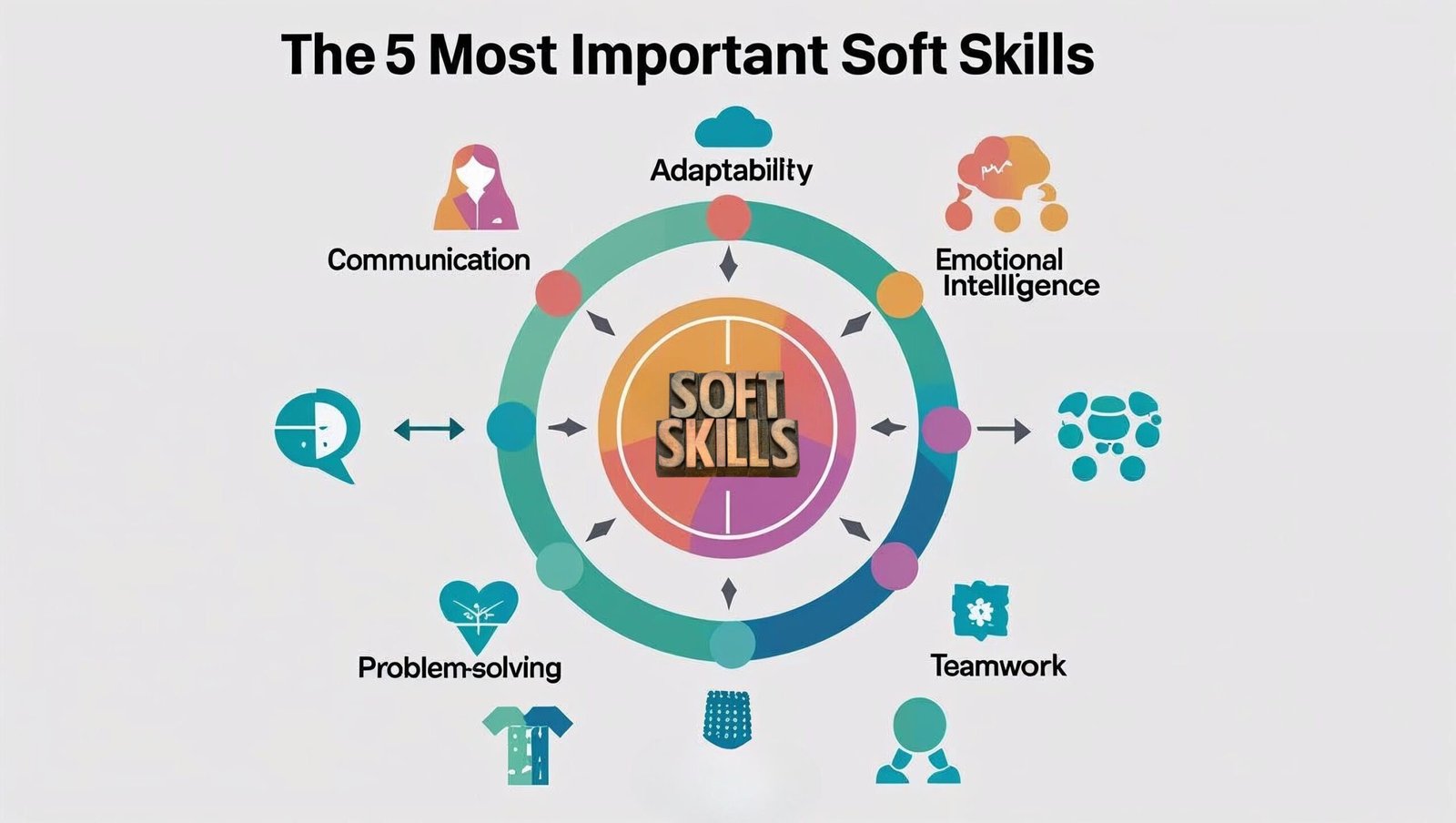No products in the cart.
What are the 5 most important soft skills? They’re the people-first traits that help you stand out—at work, at home, and in everyday life. These aren’t just popular words. They’re the things that make others trust you, follow you, or hire you. And unlike technical skills, soft skills never go out of date. They help you lead, adjust, connect, and fix problems in real time.
You already have some of these skills. They show up when you explain your ideas clearly or support a friend through a tough time. When plans change and you stay calm instead of giving up, you’re using them, too. These abilities are already strong—and when you use them intentionally, they become your greatest strength.
Let’s break them down and see how they work in real life.

Why Soft Skills Matter More Than Ever in the UK
In today’s world, employers don’t just want people who can do the job. They want people who can work well with others, handle stress, and fix problems quickly. The UK job market is changing. Roles are changing fast. But strong soft skills stay useful in every line of work.
People with strong soft skills tend to move up faster. They build better relationships. They earn more trust. Whether you’re working in retail, healthcare, delivery, or customer service—these skills help things go smoother.
And they don’t just help at work. They help with parenting, friendships, local roles, and even mental health. Soft skills help you speak up, stay calm, and bounce back.
Now let’s answer the big question.
What Are the 5 Most Important Soft Skills?

These five soft skills show up everywhere. They help you stay steady in stress, kind under pressure, and helpful in any team:
- Communication
- Adaptability
- Emotional Intelligence
- Problem-Solving
- Teamwork
You don’t need to be a manager or have a fancy job title to use them. They work in every role, every home, and every situation. And yes—you can get better at them. Let’s take a closer look at each one.
Communication: Clear Words, Real Impact
Communication is more than talking. It’s how you share your thoughts in a way others understand. It’s also about listening—not just hearing.
This skill comes into play when you explain a new task to someone at work. It’s there when you write a clear text, leave a kind voice note, or ask a thoughtful question in a meeting. You’re using it, too, when you pause and choose not to say something hurtful in a difficult moment.
Want to improve your communication? Start with listening. Really listening. Ask people to explain things in their own words. Repeat back what you think they said. Speak clearly, not loudly. Keep your tone calm, even when you’re stressed. Words can build bridges—or walls. The way you use them matters.
Adaptability: Stay Steady, Even When Things Shift
Adaptability is the ability to go with change. It’s about staying calm when plans fall apart. It’s what helps you find a new way instead of giving up.
Life doesn’t always stick to the plan. Your shift might get cancelled, a rule could suddenly change, or a system might stop working. When you’re adaptable, you don’t waste energy complaining—you pause, adjust, and keep moving forward.
Being flexible matters more than being brave. To strengthen this skill, try doing one thing differently each week. Take a new route to work. Test out a new app. Cook a meal you’ve never tried before. It’s not about getting it perfect—it’s about proving to yourself that you can handle change.
Emotional Intelligence: Read the Room and Keep It Together
Emotional intelligence is the skill that helps you understand feelings—your own and other people’s. It’s what helps you stay calm instead of shouting. It’s what helps you notice when someone’s upset, even if they don’t say it.
You use this skill when you stay kind during a tough conversation. It also shows when you stay calm and open to feedback. And when you ask a teammate how they’re really doing—that’s emotional intelligence in action.
People with strong emotional intelligence build better teams. They accept feedback with grace, recover from stress more quickly, and manage their emotions without suppressing them. They don’t pretend to feel nothing—but they don’t let big feelings take over, either.
Want to build it? Start by naming your feelings. Ask yourself, “Am I tired, angry, worried, or just hungry?” Then name what you see in others. Say things like, “You seem a bit off—want to talk?” Simple moments like that change how people see you.
Problem-Solving: Stay Calm, Find the Fix
Problem-solving is about staying focused when things go wrong. It’s about seeing what’s really going on and choosing a next step that works.
This skill doesn’t mean knowing everything. It means not panicking. You use it when the printer breaks and you find another way. It shows up when a customer’s order goes missing and you handle it without drama. And when the plan falls apart, you stay calm instead of shouting.
To build this skill, stop and ask, “What part of this can I fix?” Break the problem into small parts. Try one fix. If it fails, try something else. Solvers don’t wait for perfect. They try, learn, and move forward.
Teamwork: Get It Done Together
Teamwork is about working with people, not just next to them. It’s knowing when to lead and when to follow. It’s caring about the team’s success—not just your own.
You show this skill when you help a co-worker without being asked. It’s also there when you share credit—not just blame. And you use it when you stay positive, even during tough moments.
Great teams don’t need everyone to be the best. They need people who can listen, share, and keep going.
To improve teamwork, ask, “What does the team need right now?” Look for ways to help. Celebrate others. Say thank you. Stay steady when things get messy. People remember team players. They don’t forget the ones who had their back when it mattered.
How These Soft Skills Help You Get Hired (and Stay Hired)
Hard skills might get you the interview. Soft skills help you pass the test that really matters—how well you work with others. UK employers want people who can deal with change, think for themselves, and stay polite under pressure. That’s where soft skills shine.
When you walk into an interview, they’re not just checking your CV. They’re watching how you speak, how you listen, and how you react when you don’t know something. That’s all soft skills.
They want to see if you can handle stress. If you can explain your thoughts. If you’ll fit into the team. You don’t need a degree to show that—you just need to be real.
Why These 5 Skills Matter in Everyday Life Too
These five skills aren’t just for work—they show up in your daily life. You’ll notice them at home, in conversations, and during unexpected moments:
-
Communication comes into play when you’re making plans with your partner.
-
When the bus breaks down, adaptability helps you adjust.
-
Your emotional intelligence kicks in when your child is overwhelmed.
-
A broken boiler? That’s where problem-solving shines.
-
After a party, teamwork makes cleaning up faster and easier.
Soft skills aren’t just professional assets—they’re everyday essentials. The stronger they are, the easier life becomes.
You Don’t Need to Be Born With Them—You Can Build Them
Soft skills aren’t magic. You don’t need to be outgoing, clever, or perfect to have them. You just need to practise.
Want to start building yours? Here’s a one-week challenge:
- Monday: Ask someone how they’re doing. Then listen.
- Tuesday: Try a new way to fix a small problem.
- Wednesday: Help someone at work without being asked.
- Thursday: Change one small habit. Notice how it feels.
- Friday: Think about how you handled a stressful moment.
- Saturday: Say thank you to someone who helped you.
- Sunday: Rest, reset, and plan for next week.
Small steps build big habits. The more you practise, the more natural these skills feel.
Final Thoughts: Soft Skills Make You Stand Out—for the Right Reasons
So—what are the 5 most important soft skills? Communication, adaptability, emotional intelligence, problem-solving, and teamwork. These are the things that make people want to work with you, trust you, and follow your lead.
They’re not “extra.” They’re the glue that holds your career together. They help you get hired, stay steady, and move forward. And they’re open to everyone. No matter your background, age, or job—you can grow these skills.
You don’t need a title to lead. A certificate isn’t required to make real connections. And perfect timing? It’s never the point—you just need the courage to try again.
These soft skills make you unforgettable. In the best way possible.
Want to grow your confidence and people skills? Enrol in our online Personal Development Courses at Wise Campus and start today.







